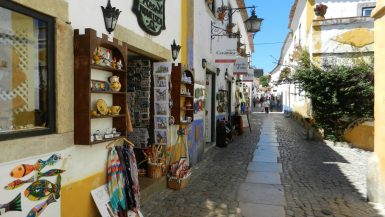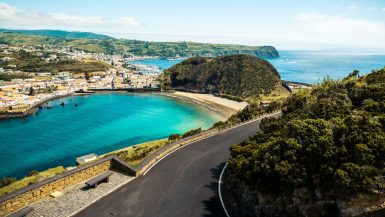
Is Azores expensive? If you’re wondering what sort of budget you’re going to need for this far-flung autonomous region of Portugal, then we can only conclude that you’re thinking about making a hop across to the middle Atlantic Ocean to see what they’re all about. Great choice. The Azores are a special, special destination.
Yep, isolated nearly 1,000 miles from the edge of the Algarve and mainland Europe, they speckle the middle of the wild seas with their rugged and lush landscapes. There are nine islets in all, some rising to soaring volcanic ridges, others beset by sinewy cliffs and wave-bashed beaches of obsidian-black sand. Surely this is just stoking the wanderlust even more?
If so, then this guide is a must read. It’s got all the ins and outs of what a trip to this distant corner of Portugal will set you back this year, with info on the cost of hotels and food, but also on what airfare look like for the ride over in the first place. Let’s get started on doing the math…
What’s the average cost of a trip to the Azores?

A midrange, average traveler is likely to spend around $1,570 per week in the Azores. That’s based on eating out each day to a value of no more than $65 and staying in hotels that are around the $93 mark. We’ve also added in over $200 for activities and factored in about the same for flights over to the islands, so you will need to budget more if you’re coming from the USA or elsewhere since connections from those are usually pricier.
Let’s break down our total to see what you can expect to spend on different things in a little more detail…
Is it expensive to travel to the Azores?

Ask 10 travelers why they want to see the Azores so much and the isolation of the place is likely to be pretty high up the list. This archipelago region of Portugal is a whopping 1,000 miles away from the nearest mainland town in Europe! Cool, yes, but not the best news if you’re wanting to jet over and keep costs low.
Thankfully, things have changed in recent years with the expansion of Ponta Delgada Airport. Now the main hub of the islands, it’s much cheaper than it once was to get to. There are even budget carriers operating routes in from Europe these days. That said, you should still expect to pay a premium for connections to this exotic corner of the continent because it’s so far away…
While it might be normal to see short-haul links to Lisbon from London for under $40, connections to Ponta Delgada are more in the region of $140 each way. You can often cut the cost a little by starting your trip in Lisbon or Porto. Those are one of the main aviation jump-off points for getting to the Azores, so there are more flights and average return airfare tend to be around the $100 mark.
Coming from the US is a little different, though the region’s own Azores Airlines now offer nonstop connections to the East Coast – to Boston and JFK in New York. They’ll set you back a premium $400-700 return, though, so it can sometimes be more economical to head to the mainland of Portugal first and then hop on a connecting flight to the Azores proper.
Overall, we’d say budget $200 for flights to the Azores from Europe and about $500 from the USA.
Is Azores expensive for hotels?

The Azores might be far away from the shimmering shorelines of southern Europe, but they aren’t untrodden places. In fact, they’ve been attracting tourists ever since the fleets of Prince Henry the Navigator drifted by in the 1400s! That means there shouldn’t be a shortage of hotels, and pretty darn good ones at that.
Booking.com reveals a whopping 1,782 properties across the islands. That’s plenty to be picking from, with all sorts on offer, from family farmhouse conversions to stylish town lofts that open onto the bar-dotted plazas.
Here’s a look at some of the very best places to stay in the Azores from each stratum of the price scale:
- SENSI Azores Nature and SPA ($$$) – This small but stunning hotel is honeymoon material, no questions. The décor channels natural materials and tops it off with a gorgeous exterior where a pool sits between the lush patchwork of fields on the western end of São Miguel Island.
- A Bica Hostel ($) – Another Ponta Delgada option that’s aimed at backpackers is this dorm-ready stay with a free breakfast. Great vibes and low prices mean it enjoys a pretty fantastic rating.
Given the wide range of hotel styles in Azores, it can be tricky to pin down what you can expect to pay here. However, as a rough estimation for a midrange pick, we’d say you’re looking at around $80-110 per night for a double room. Overall, that’s a spend of about $665 for a full week’s jaunt.
Is Azores expensive for food and drink?

We could sum it up like this: Not as expensive as you might expect. Yep, the Azores are a little pricier on the food front than places in mainland Portugal, but they aren’t excessively so. That’s especially true when you put it into perspective and realize that lots of ingredients need to be flown a whopping 1,500 kilometers before they can even be used in the local kitchens.
However, a strong reliance on regional produce combined with a pretty darn fertile backcountry helps the chefs here do pretty good deals on food, especially if you’re the sort to eat local. Here are just a few examples of the types of dishes and prices you can expect to find on a menu when eating out across the Azores:
- Tenderloin steak in passionfruit sauce – €18.50 ($20.50)
- A big plate of chips as a side dish – €3 ($3.30)
- A meat stew or a local soup dish that’s filled with meat – €11 ($12)
- A bifana, the local beef sandwich in dry bread – €10 ($10.89)
(Generally speaking, you should find that big meat dishes (which are very popular here and in Portuguese cuisine generally, in fact) and rare fish dishes (squid, calamari) are the priciest things on the menu.)
A good estimation for the total cost of an average bill in a midrange restaurant is around $30-40 per person, including wine. That tots up to a complete spend throughout the week of about $455 on food when you add on lunch and breakfast.
The cost of activities in the Azores

So, you’ve forked out for a chic hotel in the historic core of Ponta Delgada and dined on traditional Portuguese island cooking. But the expenses aren’t yet finished. You also have to fill the itinerary with things to do. Thankfully, there are some pursuits on this archipelago that shouldn’t cost you much at all – hiking the Caldeirão Viewpoint on Corvo, lazy days on Água de Alto Beach.
Others will need some of the budget set aside. Here’s a look at those:
- Quad biking jaunts around the wild Sete Cidades National Park – From $76 per person.
- A full-day’s guided tour of São Miguel, the main island in the Azores – From $75 per person.
- A short whale-watching tour – From $50 per person (plan your trip for the peak whale season in early summer for the best chance of sightings!).
- A food tour in Ponta Delgada – From $80 per person.
Of course, you don’t have to have an activity budget, but we’d highly recommend it. The reason? The Azores aren’t like mainland Portugal and the Algarve. They aren’t fringed with glistening beaches where you can laze away your days without spending a cent. In these parts, it’s the wild adventures, the wine, the whales, and the national parks that really hit the headlines, and they cost dollar bills.
Overall, a budget of about $250 for the week should suffice.
Money saving tips for traveling the Azores
If you’re keen to keep the cost of your adventure to the Azores on the down low, then be sure to consult the money-saving tips below. They’re just about tweaking your trip a little to leave extra euros in the wallet for exploring the cantinas of São Miguel and sampling the vineyards of Corvo. Let’s take a look:
- Travel in the low season – Stats show that the price of airfare to the Azores can be 50% cheaper in January than in the peak summer months of June and July. That trend carries on in hotels and even with tours on the islands, so you can save a whole bunch by coming when others aren’t (i.e. Between November and March).
- Hold out for low-cost airlines – If you can’t find a flight to Ponta Delgada on the day you want to go that’s under $500 return, the chances are you’ve picked a departure date that’s not serviced by budget carriers. Check Ryanair directly to see when they fly and re-arrange your trip accordingly, because you’ll almost certainly save money.
- Do free things – You don’t have to pay stacks for dolphin watching tours and winery visits, you know. There are beaches and hiking trails in the Azores that should cost you nada.
- Book in advance – The cost of everything from hotels to flights can skyrocket if you leave it too late. Spontaneous trips simply aren’t rewarded with low rates. Plan ahead and you can score the cheapest stays on the islands and the cheapest tickets there in the first place.
- Go for self-catering accommodation – There are loads of self-catering hotels on offer in the Azores and shopping for local food in the local markets can really help skim off what you’ll be spending on food.
Is Azores expensive? Our conclusion
Is Azores expensive? Overall, we’d say it’s just a touch pricier than the mainland of Portugal, coming in with an average price tag of about $1,570 per person for the whole week. That’s roughly comparable to the higher end of what you’d spend in Lisbon but still not outrageous considering these islands are some 1,000 miles adrift in the Atlantic Ocean.
One thing to remember is that you will need A LOT more cash at hand if you’re planning to travel in from the USA, Africa, or Asia, mainly because any flights from those places are likely to be much more expensive and the chances are you’ll need a connection to Europe first anyhow.


